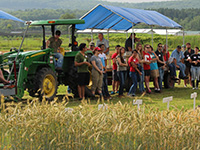Home | Unit 1
Overview
Eco-anxiety and/or Climate-anxiety can be an overwhelming fear, and through Out of Control! or Not, participants will gain a greater understanding of what is within their control and what is not. Youth learn how to take steps towards positive actions particularly those bigger issues currently out of their control.
Skill Level
Beginner/Intermediate/Advanced
Learner Outcomes, Youth will:
- Identify coping skills and build a stronger sense of self-worth and feelings of control.
- Practice adaptive strategies rather than avoiding difficult situations.
- Illustrate solutions one is using and can continue to use to address climate change problems.
Education Standard
NS.5-8.6 Personal and Social Perspectives: Personal health
Success Indicators
Practice adaptive strategies rather than avoiding difficult situations
Life Skills
Problem solving, decision making, critical thinking, stress management, managing feelings, goal management, self-motivation, self-responsibility, self-discipline
Time Needed
45 minutes
Materials List: “Out of Control!-or Not” handout, drawing paper, crayons, colored pencils, and/or markers for each participant; markers, poster paper or white or black board.
Youth Handout
Space
Indoor, safe space with tabletops or desks for drawing, and writing and walls to hang poster paper
Suggested Group Size
12-15 or more
Acknowledgements
Adapted from “What Can You Control?” found at YourLifeYourVoice.org
Introduction
Eco-anxiety and/or Climate-anxiety, is an overwhelming fear which Elizabeth Haase, MD., addresses in her article Children’s Emotional Responses to Climate Change found in the Mental Health And Our Changing Climate: Impacts, Implications, and Guidance (March 2017). Haase notes that the “direct experience with and future unknown effects of climate change can cause children to exhibit symptoms of PTSD, such as phobic behavior, panic, nightmares, and anxiety.” How can we address these responses in a positive way? One approach is through resilience. For example, Haase shares that “a capacity-building intervention developed by Seligman and Peterson (2003) aims to bolster people’s coping skills through a learned optimism framework…[by developing] a stronger sense of self-efficacy and feelings of control and encourages them to practice adaptive strategies rather than disengaging from difficulty” (2017).
Opening Questions
Choose questions appropriate for the skill level of your group.
- How do you feel about things you hear in the news or on social media?
- Do you feel overwhelmed at times? Powerless?
- How much control do you think you have over things you may face in your life?
- How do you handle situations that are out of your control?
- Is there anything in your life that you wish you could change, but cannot?
Background Information
In “Out of Control!-or Not” participants will understand what is within their control and what is not. They will learn how to take steps towards positive actions particularly those bigger issues currently out of their control.
Before the Activity: Prepare materials and handouts; Review activity scenarios, make additional scenarios that are appropriate to this group.
Let’s Do It!
Part One: What Can I Choose to Do?
Provide real-life scenarios of examples of obstacles, adapted from YourLifeYourVoice.org, with possible options that address each obstacle:
You promised your track coach you would run every day this week, however it has been raining non-stop for the last few days. What would you do?
- Not go outside and get wet, I’ll stay inside and play video games.
- Go outside and dress for the weather but be careful and still get my running in for the day.
- Go to the indoor track at school after school to get my running done for the day.
You had a disagreement with your best friend, and he/she stopped talking to you, and now you have no one to eat lunch with. What would you do?
- Since you feel awkward eating alone, you skip lunch and go to the library instead.
- You find another friend to sit with during lunch.
- Reach out to your best friend to try to work things out.
Notice that the first option in each scenario avoids the problem, and the other two options are ways around these obstacles? Seek out alternatives to solutions to your problems, keeping things within your control. Take back your control!
Part Two: “Out of Control!- or Not”
Using the “Out of Control!- or Not” handout, ask participants to illustrate through drawings on paper, things that are either in their control or not in their control, using the following examples to prompt the activity.
Things that you usually do not have control over
- Other people’s actions, feelings or words
- Obeying laws or rules
- Your past
- Weather
Things that you CAN control
- Your attitude, effort, words
- Your actions & reactions
- Your choices
Part Three: Little Things I Can Do Comic Strip
- Circle back to the issue of climate change. How do these things we can or cannot control relate to this issue of climate change, without being too intimidating and overwhelming?
- Discuss possible scenarios that describe solutions to climate change problems. Have participants illustrate in an “I Can Do Comic Strip” little steps they have in their control, either by describing things they already do (ex: recycling plastic and paper, eat more plants); and things they can do (ex: start a garden, compost bin, save rainwater) to address the issue of climate change such as:
- My family committed to reduce the amount of garbage we have each week, and in addition to recycling my plastic and paper, I will start a compost bin and make sure I save all my food scraps rather than throw them in the trash (Things I do now, things I can do).
- My science teacher wants to start an after-school garden program for the kids in my grade. Rather than go home and watch TV, I will join the garden club and learn how to grow my own food (things I can do, learn about).
- My best friend lives a few blocks from me, but rather than ask my mom or dad to drive me I ride my bike or walk (things I do now).
Talk It Over
Share
Participants share their illustrations, discuss anything surprises, concerns or anything they want to share.
Reflect/Apply
Ask youth to reflect on opening questions. How might you face situations that may be overwhelming to you? How will you teach your brain to focus on the thoughts and ideas that offer solutions to problems and issues you face that are in your control? How will you handle situations that are out of your control?
References
- Your Life Your Voice from Boys Town
- Clayton, S., Manning, C. M., Krygsman, K., & Speiser, M. (2017). Mental Health and Our Changing Climate: Impacts, Implications, and Guidance. Washington, D.C.: American Psychological Association, and ecoAmerica.
Learn More
- Cornell Garden-Based Learning
- Social impacts of climate change: UNICEF Impact of Climate Change on Children 2015.
- National Geographic: Kids sue U.S. Government over Climate Change
- Tips and Tools to help deal with challenges, at Your Life Your Voice from Boys Town. including Being Resilient









